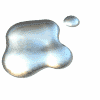During a visit to an ear, nose and throat specialist, the doctor asked me if, considering my sporting activities, I had a tendency to drink too much?
Since then, I have been puzzled by this question and I have looked for information about it on the web.
|
The aim of this page is not to question the fact that you need to drink more when doing sport, when the temperature increases, etc.
But does hyperhydration represent a health risk?
I did not want to repeat gossip.
I wanted to get my information from recognised medical sources.
|
 |
Drinking too much water can kill you.
The risks of dehydration are well-known -- but few people know that hyperhydration can also be just as dangerous. Athletes have died because they drank too much water.
By GENEVIEVE GRIMM-GOBAT.
|
 |
|
Although
you cannot live without water, drinking too much can nevertheless be fatal. A young athlete fell victim to this belief during the last Boston marathon. She died, after applying to the letter a well-known but unfounded recommendation: drink as much as possible during an endurance effort to avoid dehydration and increase performance.
A pernicious guideline, currently denounced by Timothy Noakes, from Cape Town University, an expert at the Sports Science Institute of South Africa. The results of his research have just been published in the British Medical Journal. The author warns athletes: "Endurance sport athletes must be aware that excess consumption of liquid -- as water or energy drinks -- before, during or after intense and prolonged exercise is unnecessary and may even have potentially fatal consequences."
Numerous sites providing advice to athletes seem to ignore this. For example, we still come across messages like, "the solution in sport is hyperhydration". Not true! There is a risk of hyponatraemia.
Read this source:
http://www.largeur.com/expArt.asp?artID=1386
|
Opacity, in other words loss of ocular transparency, may be due to a number of causes.
For instance, the healing phenomena after trauma or infection of the cornea, structural disorganisations of the various corneal layers by tissue hyperhydration or by accumulation with deposits of substance in case of dystrophies.
Read this source:
http://www.ophtalmologistes.org/pathologie_cornee/opacite.htm
|
|
The American Army was recently affected by one of these, to say the least, unusual, deaths. One of its young recruits died after drinking too much... water.
Back in September 1999 and March 2001, two soldiers died after drinking too much water. Each time, the young men - average age 19 - had been exposed to strong heat. And each time, they had drunk, non-stop.
One of them, a Marine, drank continuously before and during an 8-hour expedition.
After several analyses, the doctors diagnosed hyperhydration, characterised by very low sodium concentration in the blood.
Read this source:
http://www.bostani.com/trop-eau.htm |
Hyperhydration can cause serious metabolism disorders, cerebral oedema, or even a coma and death.
From time to time, experienced athletes suffer from hyponatraemia.
This was demonstrated in a study conducted with 18 000 athletes. . .
An experienced ultramarathonian even had to be sent to hospital after drinking more than 20 litres of liquid during a non-stop 100 km race lasting 8.5 hours! . . .
Read this source:
http://erpi.com/kinesante.cw/index.jsp?chapitre=576&texte=3510 |
 |
This page is given for information.
I do not want to scare you.
It is essential to drink, especially during physical exercise.
|
